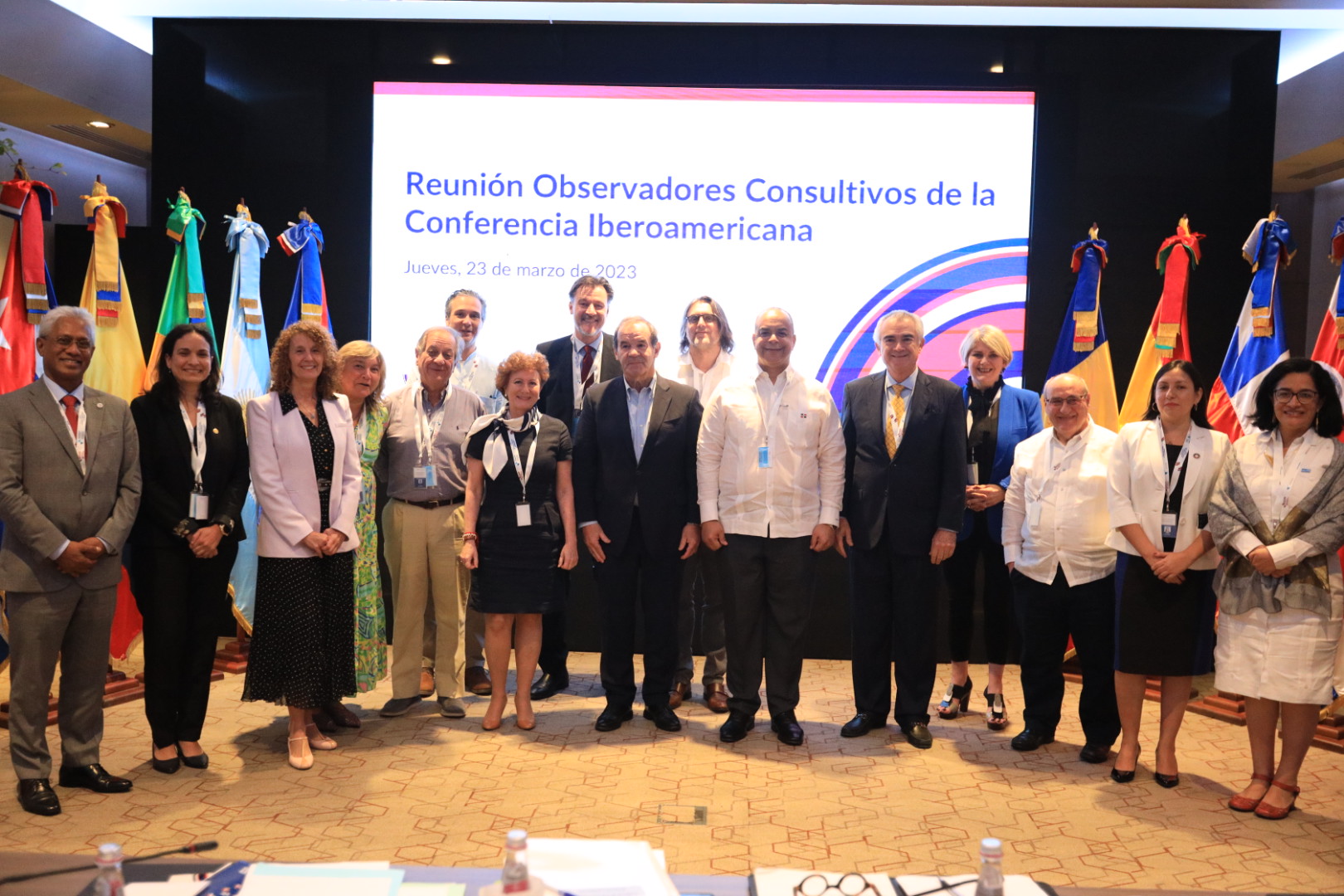The Executive Secretary of the Economic Commission for Latin America and the Caribbean (ECLAC), José Manuel Salazar-Xirinachs, expressed his intention today of deepening relations with the Ibero-American General Secretariat (SEGIB) and continuing to put the regional organization’s intellectual production at the disposal of the Ibero-American community, during the Consultative Observers’ Work Meeting , held in the framework of the XXVIII Ibero-American Summit of Heads of State and Government (Santo Domingo, March 22-25).
The meeting’s aim was to define work plans between the SEGIB and the various international organizations that make up the group of Consultative Observers, which includes ECLAC.
“I want to express my desire to deepen relations and ties with the SEGIB, and I come with the firm purpose of reaffirming ECLAC’s commitment to putting at your disposal the Commission’s analyses, which were traditionally presented at this Ibero-American Summit under the title ‘Ibero-American Spaces,’” José Manuel Salazar-Xirinachs stated at the meeting led by the Ibero-American Secretary-General, Andrés Allamand.
In the past, the Ibero-American Spaces series addressed issues such as Foreign Direct Investment, trade and investment and the knowledge-based economy, which continue to be relevant, the senior official emphasized, offering ECLAC’s technical capacities to identify topics and content of mutual interest and be able to contribute biennially to the SEGIB’s meetings with these publications.
A first step in that direction, he said, is the launch, in the Dominican Republic, of the publication entitled Ibero-America: A space of opportunities for growth, collaboration and sustainable development, which ECLAC prepared specifically for the Summit.
“The world and the region find themselves in a scenario of cascading crises,” ECLAC’s highest authority remarked, adding: “In this context of tensions and challenges, we want to contribute to the dialogue, not only based on an assessment of gaps and trends, but also the identification of a series of areas of opportunity with great potential for driving growth, creating employment and improving the well-being of Ibero-America’s population, through ambitious and transformative public policies, including public-private investments and partnerships.”
In view of the decisions that are expected to be made at the Summit, José Manuel Salazar-Xirinachs proposed taking advantage of synergies on issues such as productive development policies and the digital agenda, the strengthening of South-South cooperation, and ageing and older persons’ rights, among others.
“In the field of productive development, we see important opportunities for collaboration with the SEGIB,” he said.
ECLAC promotes exchanging experiences and better practices at the regional, national and local level between the high-ranking authorities responsible for innovation, information and communications technologies (ICTs), digital policies, industrial development, investment and the promotion of Small and Medium-sized Enterprises (SMEs), among other areas, in order to put innovation and structural diversification at the center of the development agenda, he explained.
For example, he indicated, ECLAC’s member countries approved the Digital Agenda for Latin America and the Caribbean (eLAC2024) at the Eighth Ministerial Conference on the Information Society in Latin America and the Caribbean, held last November in Montevideo.
“We also offer our experience and technical capacity to the SEGIB to make progress together towards an inclusive and sustainable digital transformation,” he underscored.
Separately, José Manuel Salazar-Xirinachs announced that on May 30-31, the first meeting of the Regional Conference on South-South Cooperation in Latin America and the Caribbean will take place in Santiago.
“This subsidiary body of ECLAC was established by countries in 2021 and is a space that, undoubtedly, allows us to explore future collaboration between both sides,” the senior official sustained, expressing his interest in having the SEGIB be an active part of the gathering to share its experience and heritage. “We hope the Regional Conference may serve as a platform for promoting the strengthening of national mechanisms for South-South and triangular cooperation, and their possible interactions with North-South and multilateral cooperation, as well as for promoting joint activities on cooperation matters,” he specified.
ECLAC’s Executive Secretary also urged for strengthening the exchange between the Ibero-American Program and the Regional Intergovernmental Conference on Ageing and the Rights of Older Persons in Latin America and the Caribbean and the Regional Conference on Population and Development in Latin America and the Caribbean, considering that ECLAC serves as the Technical Secretariat of them both.
ECLAC, he stated, has produced considerable analytical material on these issues and just recently launched a Platform for monitoring the Montevideo Consensus on Population and Development, which includes a chapter on ageing and social protection.
Finally, José Manuel Salazar-Xirinachs informed those present at the work meeting of the upcoming Sixth Meeting of the Forum of the Countries of Latin America and the Caribbean on Sustainable Development (April 26-28), the regional mechanism for follow-up and review of implementation of the 2030 Agenda for Sustainable Development, and he specifically invited the SEGIB and the other organizations in attendance to participate in that gathering.
Source: United Nations.



































